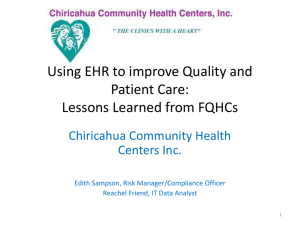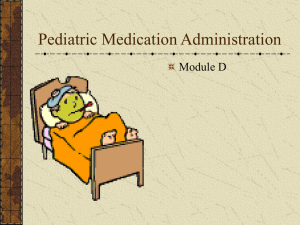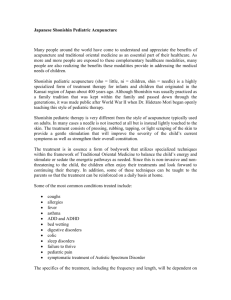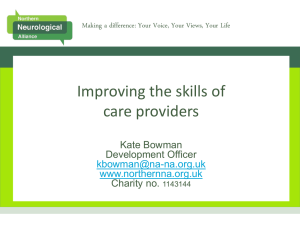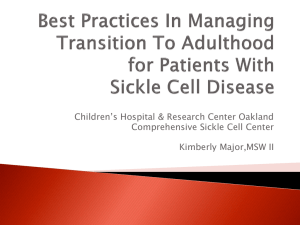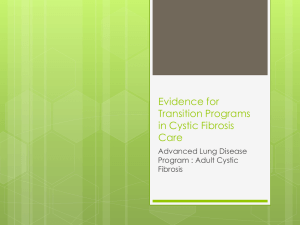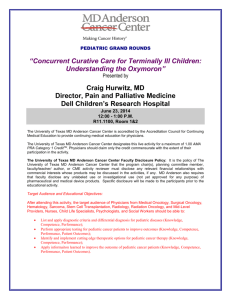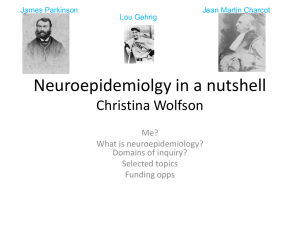Medical Knowledge - Washington University in St. Louis School of
advertisement
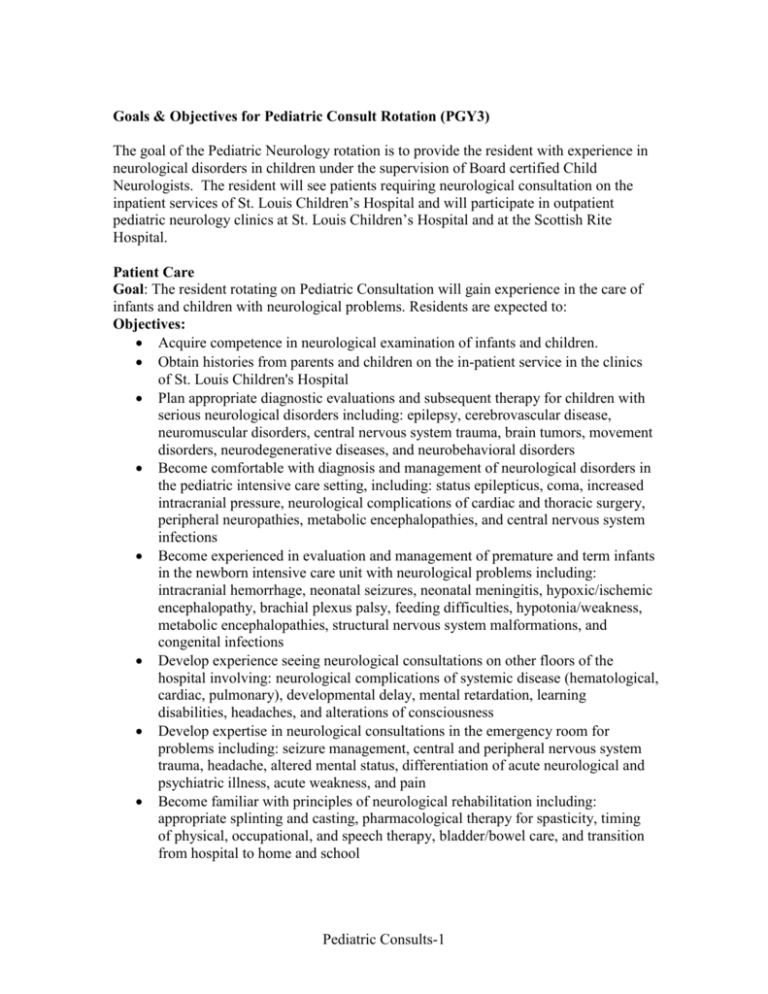
Goals & Objectives for Pediatric Consult Rotation (PGY3) The goal of the Pediatric Neurology rotation is to provide the resident with experience in neurological disorders in children under the supervision of Board certified Child Neurologists. The resident will see patients requiring neurological consultation on the inpatient services of St. Louis Children’s Hospital and will participate in outpatient pediatric neurology clinics at St. Louis Children’s Hospital and at the Scottish Rite Hospital. Patient Care Goal: The resident rotating on Pediatric Consultation will gain experience in the care of infants and children with neurological problems. Residents are expected to: Objectives: Acquire competence in neurological examination of infants and children. Obtain histories from parents and children on the in-patient service in the clinics of St. Louis Children's Hospital Plan appropriate diagnostic evaluations and subsequent therapy for children with serious neurological disorders including: epilepsy, cerebrovascular disease, neuromuscular disorders, central nervous system trauma, brain tumors, movement disorders, neurodegenerative diseases, and neurobehavioral disorders Become comfortable with diagnosis and management of neurological disorders in the pediatric intensive care setting, including: status epilepticus, coma, increased intracranial pressure, neurological complications of cardiac and thoracic surgery, peripheral neuropathies, metabolic encephalopathies, and central nervous system infections Become experienced in evaluation and management of premature and term infants in the newborn intensive care unit with neurological problems including: intracranial hemorrhage, neonatal seizures, neonatal meningitis, hypoxic/ischemic encephalopathy, brachial plexus palsy, feeding difficulties, hypotonia/weakness, metabolic encephalopathies, structural nervous system malformations, and congenital infections Develop experience seeing neurological consultations on other floors of the hospital involving: neurological complications of systemic disease (hematological, cardiac, pulmonary), developmental delay, mental retardation, learning disabilities, headaches, and alterations of consciousness Develop expertise in neurological consultations in the emergency room for problems including: seizure management, central and peripheral nervous system trauma, headache, altered mental status, differentiation of acute neurological and psychiatric illness, acute weakness, and pain Become familiar with principles of neurological rehabilitation including: appropriate splinting and casting, pharmacological therapy for spasticity, timing of physical, occupational, and speech therapy, bladder/bowel care, and transition from hospital to home and school Pediatric Consults-1 Medical Knowledge Goal: The resident rotating on Pediatric Consultation must demonstrate knowledge of established and evolving biomedical, clinical, epidemiological and social-behavioral sciences, as well as the application of this knowledge to care of patients with urgent and chronic medical problems. Residents are expected to: Objectives: Develop competence in interpreting results of laboratory tests and imaging. Teach physicians throughout the hospital appropriate responses and treatments for neurologic complications in children and infants. Demonstrate an understanding of the basic and neurological science background of neurological medicine and apply this knowledge to the clinical care of patients. Be able to explain and examine the interaction of neurological diseases with other organ systems and with other medical illnesses. Have knowledge of the most current pathophysiological explanations for neurological disorders. Develop their localization and neurological examination skills. Gain experience regarding the diagnosis and management of neurological emergencies in children including status epilepticus, acute stroke, increased intracranial pressure, meningitis, etc. Practice-based Learning and Improvement Goal: The resident rotating on Pediatric Consults must demonstrate the ability to investigate and evaluate their care of medical patients, to appraise and assimilate scientific evidence, and to continuously improve patient care based on constant selfevaluation and life-long learning. Residents are expected to develop skills and habits to be able to meet the following goals: Objectives: Teach the utility and appropriate use of specialty procedures (MR, CT, EEG, evoked potentials, sleep studies, EMG/NCV and CSF evaluations. Prioritize clinical responsibilities, provide timely service, and seek appropriate consultation and support. Develop the ability to use information technology to improve the practitioner's fund of knowledge and technical skills to provide better care to patients. Attend teaching rounds on the pediatric division at St. Louis Children's Hospital including teaching rounds three times per week, weekly neuroradiology rounds, the pediatric neurology journal club, the clinical epilepsy conference, pediatric grand rounds, and the Grand Rounds and other lectures and seminars of the Department of Neurology. Interpersonal and Communication Skills Goal: The resident rotating on Pediatric Consultation must demonstrate interpersonal and communication skills that result in the effective exchange of information and collaboration with patients, their families, and health professionals. Residents are expected to: Objectives: Pediatric Consults-2 Communicate effectively with other health care professionals. Communicate with patients and their families in easily understood and culturesensitive language. Work effectively as both a member of a professional group and as a group leader. Demonstrate the ability to serve as a consultant to colleagues and health care professionals. Maintain comprehensive, timely and legible medical records. Professionalism Goal: The resident rotating on Pediatric Consultation must demonstrate a commitment to carrying out professional responsibilities and an adherence to ethical principles. Residents are expected to demonstrate: Objectives: Learn effective communications skills with professionals from other areas of medical practice including internal medicine, general surgery, and surgical subspecialties. Understand good and bad communication behavior and leadership characteristics. Demonstrate appropriate nonverbal behavior. Have a commitment to carrying out professional responsibilities. Adhere to ethical principles. Develop sensitivity to a diverse patient population, with respect for colleagues and other health professionals. Function well as a team member Systems-based Practice Goal: The resident rotating on Pediatric Consultation must demonstrate an awareness of and responsiveness to the larger context and system of health care, as well as the ability to call effectively on other resources in the system to provide optimal health care. Residents are expected to: Objectives: Describe the responsibility of the individual physician to the patient, the practice and the overall health care system. Describe the concepts of cost containment and cost-effectiveness and learn the relative cost to the patient and society of studies and treatments requested. Describe methods for ensuring that the practitioner and the practice group use scarce resources in a sound, thoughtful and cost-effective manner. Develop necessary skills required for the independent practice of neurological care. Understand the role of the physicians order, appropriate history and the electronic medical record as they pertain to inpatient neurological care. Understand how to utilize available resources in the hospital and via electronic media to improve patient care and outcomes. Pediatric Consults-3 Evaluations: The pediatric attending physician provides written evaluation of performance. Pediatric Consults-4
